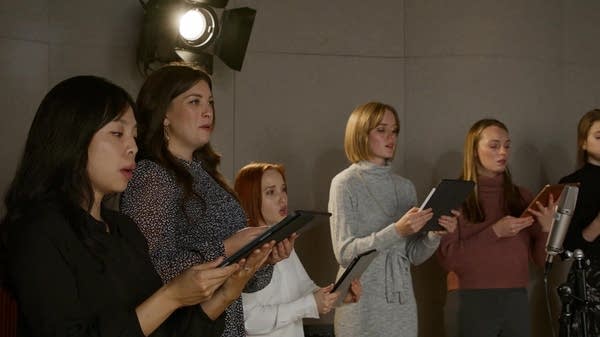On Sunday, Feb. 19, vocal activist Melanie DeMore leads the VocalEssence chorus and local school choirs in "VocalEssence WITNESS," an annual concert celebrating the contributions made to American arts by African Americans.
The theme of the 2017 WITNESS is "Underground Railroad," which is being used to shine a spotlight on Minnesota's historic role as a sanctuary for the oppressed. When the Underground Railroad ran through St. Paul, it was a sanctuary to slaves fleeing bondage; today, refugees from around the world continue to settle in the Twin Cities.
In preparation for the concert, area students — specifically, from Franklin Middle School Chorus and North High School Chorus in Minneapolis, and from Parkway Montessori and Community Middle School Chorus, and Johnson Senior High School Chorus in St. Paul — have been working with DeMore over the past year. These student musicians will all be onstage on Sunday to perform a program of songs with themes of liberation and freedom.
Among the songs on the program is "River Holy," a new piece by local composer Daniel Kantor, with lyrics by Joseph Gryskiewicz. As a musician and composer, Kantor is primarily known for his liturgical music, including his popular Christmas choral work, "Night of Silence." In the run-up to Sunday's concert, Classical MPR connected with Kantor about "River Holy." Here's what he had to say:
The WITNESS: Underground Railroad concert shines a light on Minnesota's historic role as a sanctuary for the oppressed. A piece you've composed, "River Holy," is making its Orchestra Hall premiere. What is the piece about?
"River Holy" is a quodlibet on the tune "Steal Away"; a quodlibet is a tune that may be sung simultaneously with another tune. Historians often identify "Steal Away" as a signal song that contains lyrics which hold a double meaning. On the surface, "Steal Away" describes a calling to heaven; however, its clever lyrics hide plans for the underground railroad escape of Southern slaves making their dangerous journey to freedom in the North. Slaves would walk great distances at night, hidden in the darkness. Eventually they were shuttled between houses, called "stations," either on foot, or by horses, wagons or trains. The slaves were then transported across the Ohio River to liberty in the freedom land.
"River Holy" explores the literal and metaphoric journeys taken up by the slaves, as well as all peoples who have found themselves captive, longing for freedom. It contains themes of journeying and arrival, darkness to light.
Where did you draw inspiration for this piece?
At the time, I was tutoring my friend, Dr. Joseph Gryskiewicz, in composition and theory. Dr. Joe, a brilliant plastic surgeon, has a deep interest in composing, which is how we connected.
Dr. Joe initially proposed the idea of building a new piece around "Steal Away." I then gave him the assignment of first researching "Steal Away" — a necessary step before developing any new lyrics. The research he performed inspired the "River Holy" lyrics, which we worked on together. It was a very collaborative process. Note that Dr. Joe shares the credit for the lyrics of "River Holy." Our research on "Steal Away" took us into the deeper themes that "River Holy" explores.
Were there particular musical styles you drew on or looked to when composing this work? And how is it arranged for choir?
Much of this piece was influenced by the harmonic treatments found in Eric Whitacre's choral works. His ethereal, light-infused divisi harmonies motivated my desire to explore similar sonorities. "Divisi harmony" simply means that the usual sections of a choir (sopranos, altos, etc.) are divided into at least two parts (e.g., soprano 1, soprano 2). Divisi harmony allows the composer to craft chord stacks that are much richer and deeper. Harmonically, you'll also find progressions that are influenced by the African American spiritual tradition.
The piece is for a cappella choir, SATB divisi, tenor solo, and small group of singers which is split from the group toward the end of the piece when "Steal Away" is paired with the "River Holy" melody. "River Holy" begins in the darkness of a night journey and ends in the light of arrival, suggesting entry into the ecstatic radiance of freedom, home — and ultimately, heaven.
How familiar are you with the work of Melanie DeMore? Have you worked with her previously?
I have not worked with Melanie DeMore previously. Over the past year, as this project evolved, I've been made much more aware of her work as a vocal activist. Dr. Joe and I are thrilled and honored to have our piece be part of this concert.
"River Holy" will be making its Orchestra Hall premiere. What are your feelings as you go into Sunday?
There is only emotion one I am experiencing about the Sunday performance: gratitude. I've had a few other works of mine performed at Orchestra Hall, but this is my first a cappella concert choir work done at Orchestra Hall. I owe Philip Brunelle a special thanks for this. He's conducted "River Holy" a number of times, most recently at a national festival in South Korea. Without his interest in this piece, it wouldn't have found its way to Orchestra Hall.
Sunday is also my mother's 80th birthday. She said the only gift she wanted from me was to attend this concert. So you can imagine my gratitude in being able to share this experience with her.
"VocalEssence WITNESS: Underground Railroad" takes place Sunday, Feb. 19, at 4 p.m., at Orchestra Hall in Minneapolis. More information is available at the VocalEssence website.
Love the music?
Show your support by making a gift to YourClassical.
Each day, we’re here for you with thoughtful streams that set the tone for your day – not to mention the stories and programs that inspire you to new discovery and help you explore the music you love.
YourClassical is available for free, because we are listener-supported public media. Take a moment to make your gift today.












